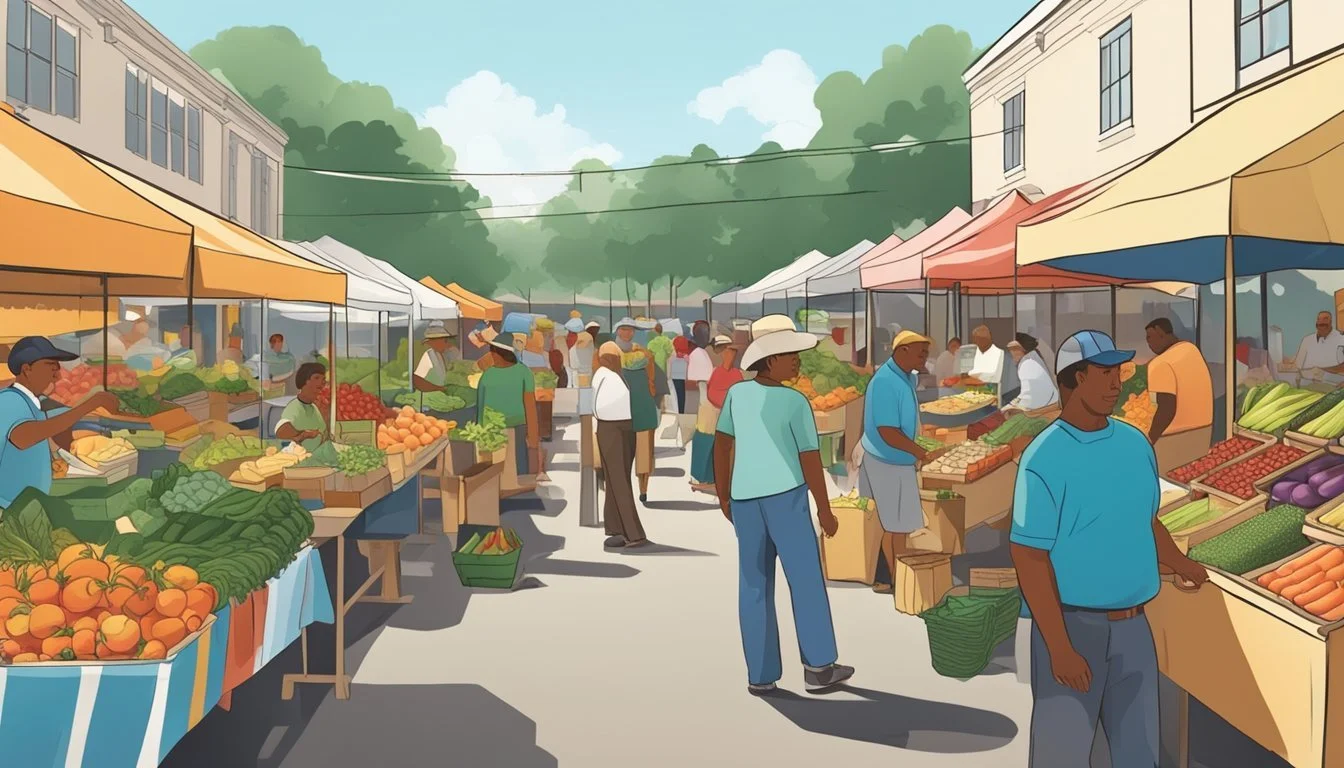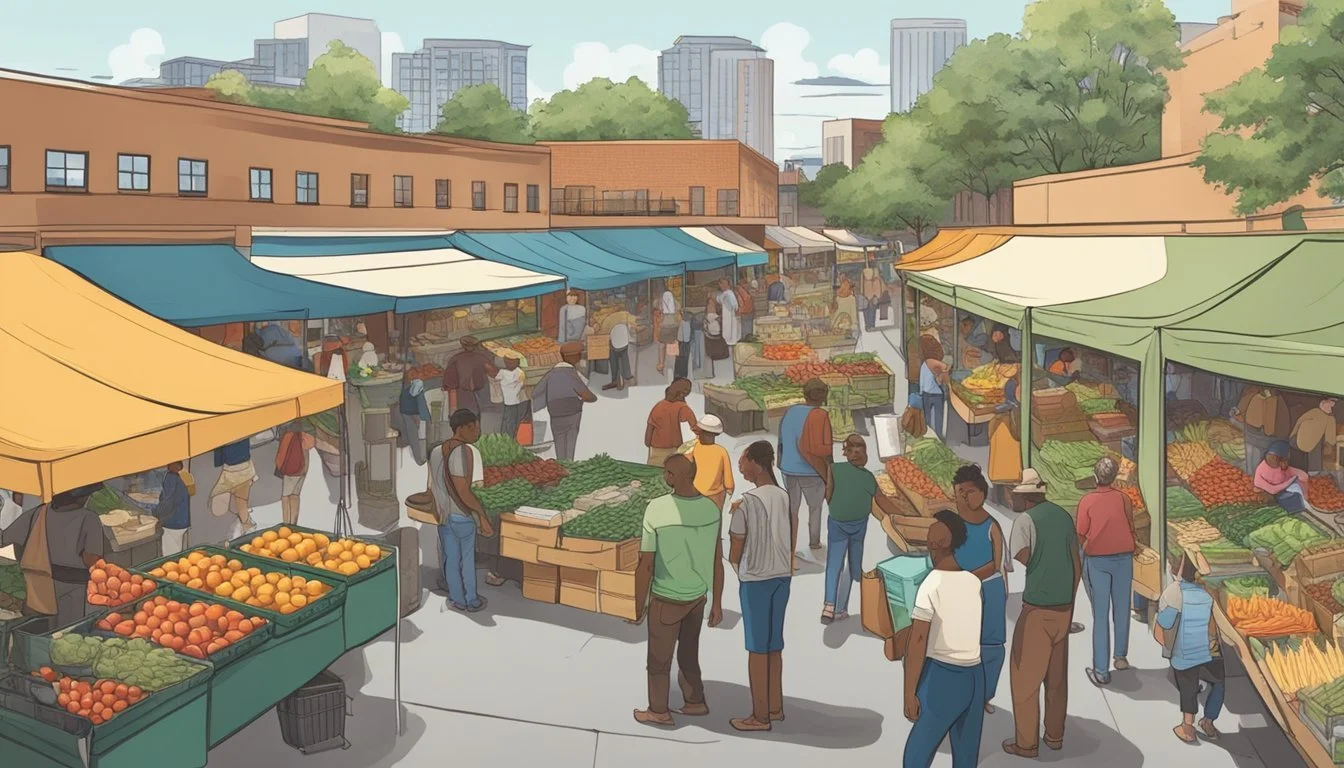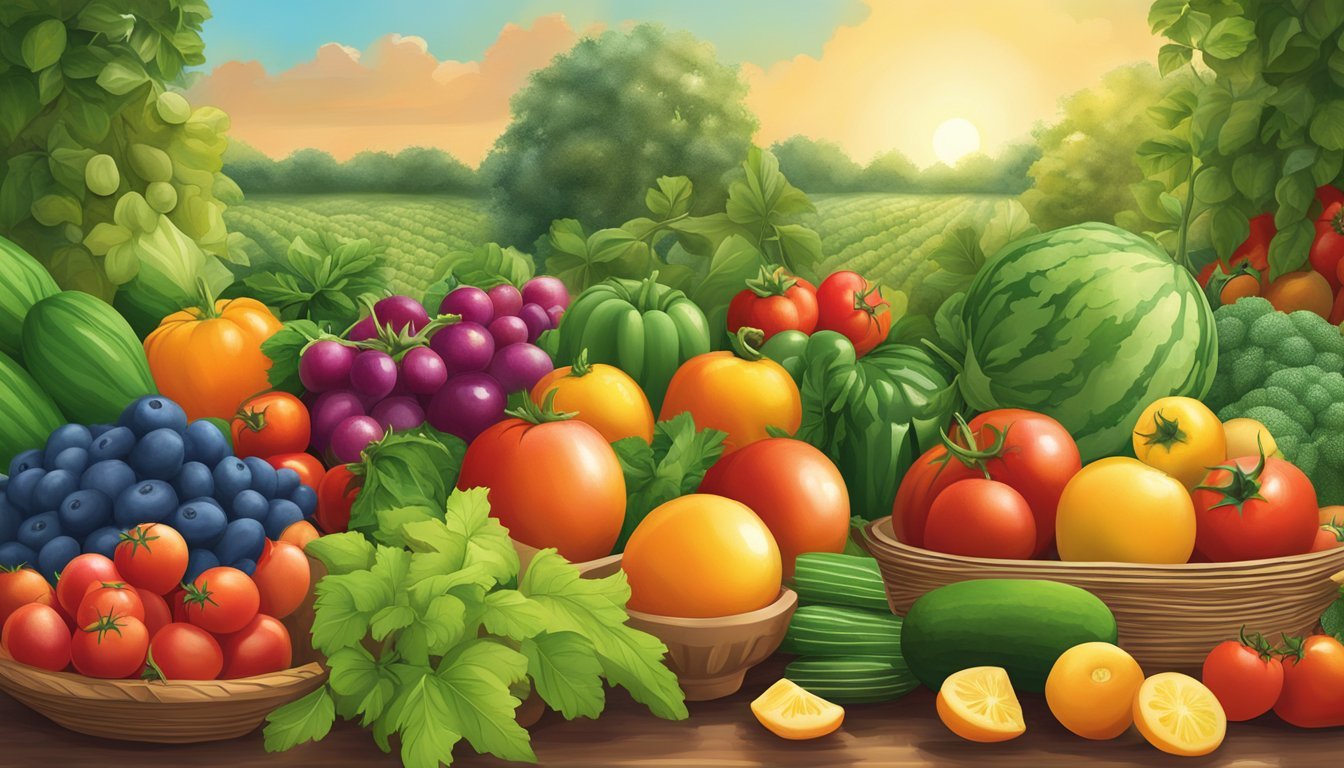Community Supported Agriculture (CSA) in Jacksonville, FL
A Guide to Local Farm Shares
Community Supported Agriculture, or CSA, has taken root in Jacksonville, FL, giving residents an opportunity to partake in a sustainable food system that supports local farmers and producers. This model of agriculture allows consumers to subscribe and receive a share of seasonal produce directly from local farms. In return, farmers gain a direct market for their crops, which can lead to more stable financial support throughout the growing season.
In Jacksonville, the CSA scene is flourishing, with several farms offering subscriptions that provide a variety of local, often organic, fruits and vegetables. Programs vary, with some providing weekly, bi-weekly, or monthly deliveries to homes or designated pickup locations. Consumers in the Jacksonville area embrace the CSA movement not only for the fresh quality of produce but also as a means to strengthen the local agricultural economy and foster a closer connection with the source of their food.
Such direct partnerships between Jacksonville residents and local farmers through CSAs help ensure that the community has access to nourishing, freshly-picked produce. This arrangement empowers local farmers, reduces the carbon footprint associated with long-distance food transportation, and promotes healthier eating habits by offering a selection of seasonal goods that might not be readily available at traditional grocery outlets.
Understanding CSA
Community Supported Agriculture (CSA) represents a movement towards locally sourced food with multiple benefits for consumers and producers. It is a partnership that connects local farmers directly with consumers within the community.
Concept and History
The CSA model arose out of a collective desire for fresh, locally grown produce. It started during the 1980s in the United States and has seen a steady rise in popularity. This system thrives on the principle that members pay for shares of a farm's produce upfront, which in turn provides the farmers with a stable income regardless of the season.
How CSA Works
A CSA functions on a subscription basis where members receive periodic distributions of the farm's products. Generally, customers sign up for a membership at the start of the growing season and in return, they receive a variety of fresh, seasonal goods often through weekly deliveries or pickups at local farmers markets.
Benefits of Being CSA Members
CSA memberships offer a plethora of advantages:
Quality and Freshness: Members enjoy high-quality, fresh produce harvested at the peak of ripeness.
Healthy Choices: By receiving a share of varied produce, members have access to a diet rich in nutrients.
Support for Local Farmers: Subscriber fees provide local farmers with predictable income and financial security.
Reduced Environmental Impact: The local nature of CSA minimizes transportation, which helps lower the environmental impact.
Community Connection: CSA fosters a sense of community through direct interaction with the farm and farmers.
Membership in a CSA guarantees that one is directly supporting their community and eating healthily while also indulging in the highest quality farm products.
Local CSA Farms in Jacksonville
Jacksonville, Florida, is home to a thriving community-supported agriculture (CSA) scene, with local farms offering fresh, seasonal produce directly to consumers. These farms not only promote the consumption of local foods but also provide a direct link between Jacksonville residents and the farmers who cultivate their food.
Down to Earth Farm
Down to Earth Farm is a small yet dedicated venture that provides a bounty of local foods to the Jacksonville area. Through its CSA program, this farm focuses on delivering fresh produce to its members throughout the farming season. Their offerings include a variety of organic vegetables, underlining their commitment to sustainable farming practices.
Frog Song Organics
Another noteworthy participant in Jacksonville's local CSA landscape is Frog Song Organics. This certified organic farm is renowned for its high-quality fresh produce and active presence at local farmers' markets. They offer their CSA members a diverse array of organic vegetables, which are harvested at the peak of freshness to ensure the best flavor and nutritional value.
Exploring Farm Locations
When considering joining a local CSA, the location is an essential factor. Many CSAs in Jacksonville, FL, such as Down to Earth Farm and Frog Song Organics, are situated conveniently for city residents. They enable consumers to connect with the very source of their food, fostering a sense of community and local sustainability. These farms serve as a testament to the vitality of Florida's local farming community.
Subscribing to a CSA
Subscribing to a CSA in Jacksonville, FL, requires consumers to purchase shares in a farm's seasonal produce. This model fosters a partnership between local farmers and community members through investment and shared risk.
Understanding CSA Shares
A CSA share represents a portion of the farm’s harvest. Consumers subscribe by purchasing these shares before the growing season begins, ensuring they receive a box of vegetables or other farm products regularly throughout the season. Shares typically vary in size to accommodate different household needs and may also include other farm products such as fruits, eggs, and dairy.
Share Types
Individual Share: Suitable for single consumers
Small Family Share: Ideal for small families, usually provides enough produce for 2-3 people
Large Family Share: Best for larger households or those with higher vegetable consumption
Share Contents
Vegetables: A mix of seasonal vegetables, often varying week to week
Fruits: Seasonally available fruits may be included
Additional Products: Eggs, dairy, and other farm products can be part of some shares
Payment and Commitment
Joining a CSA involves both a financial commitment and an acknowledgment of shared risk, as consumers support the farm's operations for the full season. Payment options are generally straightforward:
Payment Options
One-time Payment: A lump-sum payment covering the entire season
Payment Plan: Broken down into multiple payments, suitable for different budgets
Members commit upfront, which means they share in the bounty of a good season as well as the possibility of a lower yield due to unforeseen circumstances. This model creates a direct partnership between farmers and members, with a mutual commitment to sustainably produced, fresh, local food.
CSA Benefits and Relationships
Engaging with Community Supported Agriculture (CSA) in Jacksonville, FL offers a spectrum of advantages that accrue to both consumers and farmers. It fosters a direct relationship that re-envisions food consumption and agriculture as a collaborative effort towards sustainability and community welfare.
Advantages for Consumers
Consumers enjoy a range of benefits from participating in a CSA program. They have access to:
Ultra-fresh food: The produce is at its peak in both flavor and vitamin content.
Direct relationships with farmers: This connection provides insights into how their food is grown.
Community ties: Joining a CSA immerses members in a family-oriented food community.
Market stability: Consumers help create a stable market for local produce.
Advantages for Farmers
Farmers gain distinct advantages through CSA programs. These include:
Market stability: By selling directly to consumers, farmers gain financial stability with pre-season income.
Direct customer relationships: These connections can lead to valuable feedback and customer loyalty.
Rewards for sustainability: Farmers who engage in environmentally friendly practices often find support within the community.
Building Community Through CSA
Community Supported Agriculture is as much about growing food as it is about nurturing relationships. It connects family units in Jacksonville with the greater community, providing:
Opportunities for kids to learn about agriculture.
Social gatherings that strengthen community bonds.
A sense of belonging that comes with supporting local farmers and contributing to local food systems.
By fostering these relationships, CSAs help weave a stronger, more resilient community fabric.
Participating in CSA Programs
Participating in Community Supported Agriculture (CSA) programs in Jacksonville, FL, allows consumers to access fresh, seasonal produce while supporting local farmers. This partnership embodies community involvement and fosters a deeper understanding of food production cycles.
Choosing Your Level of Participation
Individuals can choose from various CSA membership levels. Standard shares typically include a box of vegetables delivered weekly, bi-weekly, or monthly. Some CSAs in Jacksonville offer flexibility with "half shares", which are suitable for smaller households, or "market shares", where members have more control over the produce they receive. Consumers can pick up their share at designated pick up locations or opt for home delivery services. Participation often extends beyond purchasing; members might also engage in farm events or volunteer days, enhancing their community involvement.
Risks and Rewards of CSA
CSA membership involves a shared risk between the consumer and the farmer. Since agriculture is inherently subject to the whims of nature, there is always the possibility of crop failure due to factors like extreme weather or pests. Despite this, the rewards often outweigh the risks. Members enjoy fresh, seasonal food, and the satisfaction that comes with supporting local agriculture. They also contribute to the farmer's upfront costs which helps stabilize the farm's financial planning.
Receiving and Using CSA Products
Upon joining a CSA, members typically receive their shares on a weekly basis. The CSA provides seasonal produce, which may introduce members to new varieties of vegetable and encourage them to explore new ways of cooking. To fully benefit from the CSA experience, participants should be open to adjusting their cooking habits according to the CSA's offering and be prepared to handle the abundance of produce by learning preservation techniques or sharing with neighbors.
Seasonal Aspects and Produce Availability
Community Supported Agriculture in Jacksonville, FL rides the rhythms of the seasons to provide a bounty of fresh, locally-grown produce. Members can experience the quality and variety that each season brings, with offerings that evolve throughout the year.
Seasonal Varieties and Harvest Cycles
Jacksonville's CSA harvest cycles align closely with the region's seasonal climate, dictating the availability of a diverse array of vegetables and fruits. During the warmer growing season, one can expect a rich selection of seasonal produce. Herbs, greens, and seasonal vegetables thrive in these conditions, ensuring fresh and flavorful offerings for CSA members.
Harvest times can vary, but typically:
Spring: March to May
Summer: June to August
Fall: September to November
Winter: December to February
A table of seasonal produce often includes:
Season Produce Examples Spring Lettuce, Strawberries, Herbs Summer Tomatoes, Peppers, Melons Fall Pumpkins, Apples, Root Vegetables Winter Kale, Collards, Citrus Fruits
Winter and Spring CSA Offerings
The winter season in Jacksonville does not mark a halt in the local CSA offerings. Despite cooler temperatures, winter crops consist of hardy greens such as kale and collards, which can withstand the cold. Citrus fruits also reach their peak during winter months, offering vibrant flavors to members.
As the season transitions to spring, the CSA boxes start to see a variety of fresh options. Members can enjoy early harvests of springtime favorites like tender lettuces and aromatic herbs. The anticipation of the first strawberries of the year highlights the seasonal shift, promising sweet and juicy rewards.
Spring's arrival renews the cycle of seasonal food availability and prompts farmers to plant a wide assortment of vegetables for the approaching summer. This season's offerings underscore the CSA's commitment to fresh, seasonal produce and the connection between the land, the grower, and the consumer.
Connecting with Local CSAs
Community Supported Agriculture (CSA) is a significant agricultural movement in Jacksonville, allowing consumers to build relationships with local farms. By selecting a CSA program, customers support local food systems and influence how their food is grown.
Finding the Right CSA for You
When looking for a CSA in Jacksonville, consumers should consider their food preferences and lifestyle. They can choose from various CSA programs offered by farms such as Local Fare Jax, which delivers to areas like St. Johns, Atlantic Beach, and Orange Park. It's important for consumers to research and determine which program fits their needs, whether they prefer weekly, bi-weekly, or monthly deliveries.
Checklist for Selecting a CSA:
Delivery Options: Evaluate the frequency and flexibility of deliveries.
Production Practices: Look for farms that align with your values (e.g., organic, sustainable).
Variety of Produce: Ensure the offerings align with your preferences.
Share Size: Determine the right amount of produce for your household.
Questions to Ask Potential CSA Farms
Establishing communication with CSA farms can give further insight into their operations and offerings. Consumers may contact farms like EdenGardensJax by phone or email to inquire about their practices. It's advisable to ask about their farming methods, the types of products included in the shares, and how they handle low yield seasons.
Sample Questions:
What is the typical variety of produce in a share?
How does the farm address crop failures?
Are there options for customizing the contents of the CSA share?
What is the farm's customer service policy for issues with the share?
Visiting CSA Farms
If possible, consumers should visit the farms they are interested in. This can provide a valuable farm experience, helping to establish a personal connection and better understanding of where their food comes from. Visiting a farm such as EdenGardensJax enables consumers to see farming practices firsthand and fosters a deeper community relationship.
Key Points to Consider When Visiting:
First-Hand Experience: Witness the farm's operations and build a personal rapport.
Farming Practices: Learn about the techniques and sustainability efforts utilized.
Community Engagement: Understand how the farm interacts with and contributes to the local community.
Conclusion
Community Supported Agriculture represents a strong partnership between local farmers and the community in Jacksonville, FL. By subscribing to CSAs, residents directly support local agriculture, ensuring the survival and prosperity of regional farms.
Key Advantages of CSA Participation:
A Localized Economy: CSA members fuel economic stability within the community by investing their dollars back into local businesses.
Enhanced Freshness: The farm-to-table approach guarantees access to the freshest produce, often harvested within hours of delivery.
Environmental Responsibility: Reduced transportation distances lower carbon footprints, making CSAs a greener choice.
Benefits for Farmers Benefits for Consumers Predictable income stream Access to healthy, seasonal food Stronger connection with consumers Education about food sourcing Ability to plan ahead with assured support Build community with like-minded individuals
Local Fare Jax and other area CSAs underscore a collective commitment to sustainable practices. They not only cater to the nutritional needs of participants but also cultivate a sense of connection by bringing the producer and consumer closer together.
CSA members typically experience a deeper appreciation for their food, understanding its origin and the effort taken to grow it. The result is a strengthened food community where members are active participants in the journey from seed to table, and farmers receive the support necessary to continue heirloom practices and nurture biodiversity.
In summary, Jacksonville's adoption of Community Supported Agriculture promotes health, sustainability, and a tight-knit local community, all anchored by an honest partnership between residents and their farmers.








